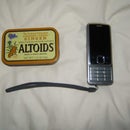Introduction: Portable Solar Generator on a Bike Trailer for Burning Man
AKA Solar panel On Wheels, aka Post Apocalyptic Power Wagon, aka Bike Dance Party USA, aka I should hook up a electric motor to this bike cuz the trailer is so damn heavy from the battery...
First let me start by saying this is not a plan on how to exactly build an Off Grid Solar System. Depending on what type of solar module or modules you use or what type of charge controller and battery you use. The plan can come out completely different.
This is more of an overview of a simple system I built with what I had available. But.. It does stand as a very good model for a simple Off Grid system that's got a little bit of umph behind it.
I have ran off this trailer such things as a small refrigerator, a skill saw, several drop lights, a Sawzall with a drop light, ghetto blaster and 3 strings of xmas lights all night, electric tea pot, and the list goes on.
So the story goes something like this. I was going to Burning Man with my work http://www.eesolar.com/ to build 9 solar arrays. First a 14k array for our camp to serve as a public charging station for electric art cars, camp batterys and, anything else under the sun (laptops, ipods, flash lights, vibrators, what ever). Then we built arrays to power 3 more camps and finally we fitted 5 major art installations with smaller solar arrays (1 to 2 k).
I needed a way to run power tools to build the other arrays so I came up with the idea to retrofit this cheapy kid bike trailer that I got at a thrift store for 8 bucks with a 80 watt solar module, 150 amp hour battery, charge controller and, 400 watt inverter.
The idea is that I can attach my trailer to my bike with the solar junk and ride to other camps that don't have power and work on stuff. Now that I'm home I can ride my bike to anywhere there's a party happen'n and make the scene.
First let me start by saying this is not a plan on how to exactly build an Off Grid Solar System. Depending on what type of solar module or modules you use or what type of charge controller and battery you use. The plan can come out completely different.
This is more of an overview of a simple system I built with what I had available. But.. It does stand as a very good model for a simple Off Grid system that's got a little bit of umph behind it.
I have ran off this trailer such things as a small refrigerator, a skill saw, several drop lights, a Sawzall with a drop light, ghetto blaster and 3 strings of xmas lights all night, electric tea pot, and the list goes on.
So the story goes something like this. I was going to Burning Man with my work http://www.eesolar.com/ to build 9 solar arrays. First a 14k array for our camp to serve as a public charging station for electric art cars, camp batterys and, anything else under the sun (laptops, ipods, flash lights, vibrators, what ever). Then we built arrays to power 3 more camps and finally we fitted 5 major art installations with smaller solar arrays (1 to 2 k).
I needed a way to run power tools to build the other arrays so I came up with the idea to retrofit this cheapy kid bike trailer that I got at a thrift store for 8 bucks with a 80 watt solar module, 150 amp hour battery, charge controller and, 400 watt inverter.
The idea is that I can attach my trailer to my bike with the solar junk and ride to other camps that don't have power and work on stuff. Now that I'm home I can ride my bike to anywhere there's a party happen'n and make the scene.
Step 1: Stuff You Need
First lets me say that this isn't really about how to build a solar bike trailer. That's why I am not getting into every little hole to be drilled and screw to be screwed. It more an illustration on how to set up a very simple Off Grid solar system and the components necessary. You should be able to take this simple plan and build it into almost anything (camping trailer, RV, apartment balcony, little cabin in the woods, ect.).
My goal was to not buy anything new for this project. I found it all left over in my garage from other projects or at my work in the warehouse in some boxes of old parts. I know that most people don't have solar modules and and charge controllers laying around.. but I will try and give you some idea on how to spend as little $$ as possible. I figure if you bought this all new it could cost from $350 to $600.
TRAILER Build one!!! (search "bike trailer" on this silly site), garage sales, Craigs List, thrift stores, ect.. The One I used is a cheap one. I took off the plastic body and cut it in half. Then I bolted it back on the frame and bolted scrap plywood over the wheels to serve as a strong platform.
SOLAR MODULE (aka Solar Panel) This one is a 17 volt 80 watt. I scrapped it from a downed freeway sign that had solar lighting. We are going to be using a Module around 17v because we are running a 12v battery. You can look for them used on Ebay or hunt for a new one online. I just searched and found new ones from $156 to $250 (google "solar panel 80 watt")
INVERTER This is a regular car inverter that you could plug into you cig. lighter outlet. It changes the 12 volt DC(like a car battery) into 120 volt AC (like your house) This one came from Home Chepot and is rated at 400 watts that's plenty for a system this size.
CHARGE CONTROLLER Now this is a can of worms. The charge controller protects the battery while it is charging. It keeps the right amount of juice coming in and sometimes even going out. The one I am using is a Trace C40 (read here for more about this CC) it is total over kill for this project. Trace also makes a really good smaller one that would have worked just fine the C12 (more about the C12) The C40 cost around $150 new and the C12 about half that. They are high quality pieces of electrical equipment and will last for years. You can buy a simple 12volt charge controller online for $20 to $30 that will work.
BATTERY You will need a 12 Volt deep cycle battery also call a marine battery. In theory you could use a 24 volt battery but you would need a 24v inverter and module. Or two 6 volts ..or.. or.. I'll save you the class on batterys.. that's what the interweb is for. I am using a sealed gel type battery for UPS systems it is 150 amp hours (that pretty big 80 ish lbs.) I get them free from a buddy that builds UPS systems every once in a while.. that's why I'm using this battery. It retails around $350. I could use a lighter battery like Li-Ion and it would weigh only 30 lbs but it would cost $2000.
MOUNTING HARDWARE The hardware I used was left over from residential solar installations. It is light weight and very strong. You can use a scrap of steel strut, u brackets, nuts, bolts, and fender washers.
WIRE I used leftover scrapes of multi strand 10ga wire
My goal was to not buy anything new for this project. I found it all left over in my garage from other projects or at my work in the warehouse in some boxes of old parts. I know that most people don't have solar modules and and charge controllers laying around.. but I will try and give you some idea on how to spend as little $$ as possible. I figure if you bought this all new it could cost from $350 to $600.
TRAILER Build one!!! (search "bike trailer" on this silly site), garage sales, Craigs List, thrift stores, ect.. The One I used is a cheap one. I took off the plastic body and cut it in half. Then I bolted it back on the frame and bolted scrap plywood over the wheels to serve as a strong platform.
SOLAR MODULE (aka Solar Panel) This one is a 17 volt 80 watt. I scrapped it from a downed freeway sign that had solar lighting. We are going to be using a Module around 17v because we are running a 12v battery. You can look for them used on Ebay or hunt for a new one online. I just searched and found new ones from $156 to $250 (google "solar panel 80 watt")
INVERTER This is a regular car inverter that you could plug into you cig. lighter outlet. It changes the 12 volt DC(like a car battery) into 120 volt AC (like your house) This one came from Home Chepot and is rated at 400 watts that's plenty for a system this size.
CHARGE CONTROLLER Now this is a can of worms. The charge controller protects the battery while it is charging. It keeps the right amount of juice coming in and sometimes even going out. The one I am using is a Trace C40 (read here for more about this CC) it is total over kill for this project. Trace also makes a really good smaller one that would have worked just fine the C12 (more about the C12) The C40 cost around $150 new and the C12 about half that. They are high quality pieces of electrical equipment and will last for years. You can buy a simple 12volt charge controller online for $20 to $30 that will work.
BATTERY You will need a 12 Volt deep cycle battery also call a marine battery. In theory you could use a 24 volt battery but you would need a 24v inverter and module. Or two 6 volts ..or.. or.. I'll save you the class on batterys.. that's what the interweb is for. I am using a sealed gel type battery for UPS systems it is 150 amp hours (that pretty big 80 ish lbs.) I get them free from a buddy that builds UPS systems every once in a while.. that's why I'm using this battery. It retails around $350. I could use a lighter battery like Li-Ion and it would weigh only 30 lbs but it would cost $2000.
MOUNTING HARDWARE The hardware I used was left over from residential solar installations. It is light weight and very strong. You can use a scrap of steel strut, u brackets, nuts, bolts, and fender washers.
WIRE I used leftover scrapes of multi strand 10ga wire
Step 2: The Trailer
Like I said earlier any trailer will do, just make sure its strong. I bolted the plywood on good by drilling holes in the steel frame. Then I used some old book shelf brackets to hold the vertical plywood up. That's where I'm going to mount the electrical components. The solar module is mounted with really nice solar industry specific parts from ProSolar but you can use stuff in your garage or hardware store. I did a quick search and found some random PDF with pictures of steel strut and hardware see chapter 15
The Battery is held on with an old nylon strap buckle. I think a bungy cord will do.
The Battery is held on with an old nylon strap buckle. I think a bungy cord will do.
Step 3: Elecrtrical Componets and Wiring
I made up a really simple wiring diagram to show you how I wired this thing.
Step 4: Well Its Pretty Much Done...
Remember this was more of an illustration on how a simple off grid PV system works... not so much of a how to build the darn thing. I hope this got your "wheels turning"











